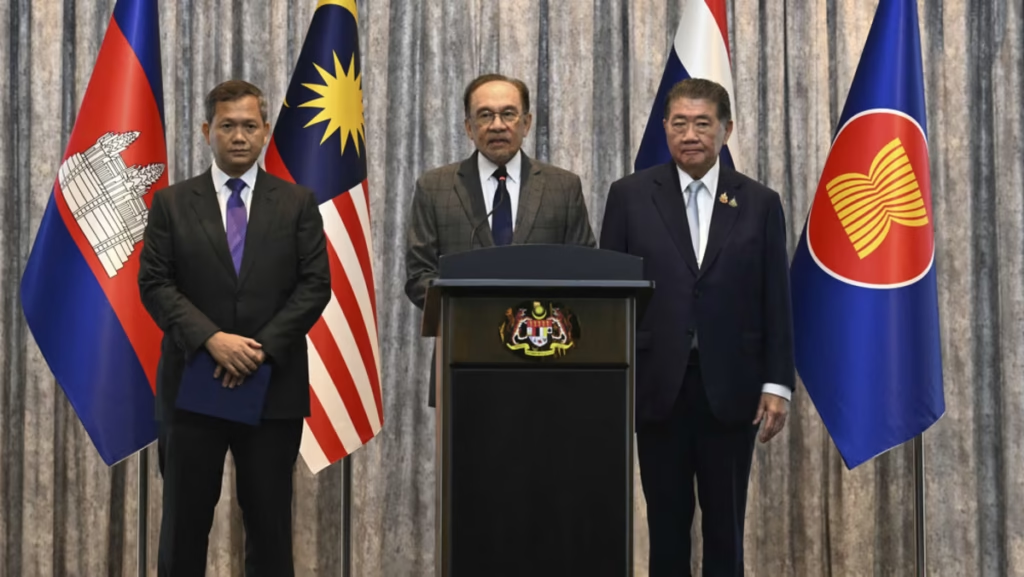
In a major diplomatic breakthrough aimed at defusing rising tensions between Thailand and Cambodia, the Governments of Malaysia, Cambodia, and Thailand issued a Joint Press Release after a Special Meeting convened in Putrajaya on July 29, 2025. The high-level dialogue was hosted by Malaysian Prime Minister Dato’ Seri Anwar Ibrahim and attended by Cambodian Prime Minister Samdech Moha Borvor Thipadei Hun Manet and Thailand’s Acting Prime Minister Phumtham Wechayachai. The meeting was co-organized by the United States, with active participation from the People’s Republic of China, and resulted in an immediate and unconditional ceasefire agreement effective from 24:00 hours local time on July 28, 2025.
President Donald J. Trump of the United States actively supported the mediation effort, maintaining direct contact with both Cambodian and Thai leaders, while China facilitated dialogue through its regional diplomatic channels and called for restraint from both sides. The meeting’s international character underscored a unified commitment to peace and regional stability, reflecting the rising importance of ASEAN and multilateral cooperation in managing intra-regional conflicts.
The agreement established a full cessation of hostilities effective from midnight on July 28, 2025, and arranged for informal meetings between regional military commanders from both sides, specifically Regional Military 1 and 2 from Thailand and Regional Military 4 and 5 from Cambodia, to be held at 07:00 on July 29, 2025. A formal session of the General Border Committee was scheduled for August 4, 2025, to be hosted by Cambodia. Malaysia, as ASEAN Chair, pledged to coordinate an observer mission to verify the ceasefire implementation in consultation with other ASEAN Member States. The agreement also called for the immediate restoration of direct lines of communication between both Prime Ministers, Foreign Ministers, and Defence Ministers, with instructions issued to the Foreign and Defence Ministries of the three nations to devise a comprehensive monitoring and reporting framework.










Despite the goodwill at the negotiating table, military developments on the ground soon clouded the agreement. The Royal Thai Army reported multiple violations by Cambodian forces in areas including Chong Bok, Chong Anma, Sam Tae, Prasat Ta Kwai, and Phu Ma Kheua, just hours after the ceasefire took effect. Major General Winthai Suvaree, Royal Thai Army Spokesperson, issued a strong condemnation, stating that it was deeply regrettable that at the designated time, the Cambodian side used weapons to attack Thai territory, constituting a deliberate violation of the agreement aimed at destroying mutual trust. He affirmed that Thai forces responded only in self-defense, in line with international legal norms, and not for aggression, emphasizing that they acted solely to protect their sovereignty and their people.
The Royal Thai Armed Forces Headquarters, through its spokesperson Major General Vithai Laithomya, reiterated that Thailand had fully adhered to the ceasefire but was forced to respond to Cambodian provocations. He stated that when Thailand stopped but Cambodia did not, the world must know that Cambodia is the violator, persistently breaching the agreement and threatening regional peace. The Thai military called on the international community to recognize the violations and support efforts to enforce the ceasefire and restore peace.
While initial military-level talks between field commanders were scheduled for early July 29, logistical adjustments were made, moving the meeting to 10:00 hours. Malaysian authorities remain hopeful that continued dialogue, supported by ASEAN’s mechanisms and global diplomatic pressure, will prevent further escalation. ASEAN, under Malaysia’s stewardship, is expected to play a central role in sustaining peace and building a long-term framework for cross-border cooperation and dispute resolution.
The Special Meeting in Putrajaya represents a crucial diplomatic milestone, but the incidents following the ceasefire deadline underscore how delicate the situation remains. The international community now watches closely as both nations are pressed to honor their commitments and restore faith in peaceful negotiation as the path forward. The coming days, particularly the August 4 General Border Committee meeting, will be critical in determining whether the ceasefire can evolve into lasting stability or falter under renewed tensions.
About The Author
Discover more from Faith & Freedom News - FFN
Subscribe to get the latest posts sent to your email.



